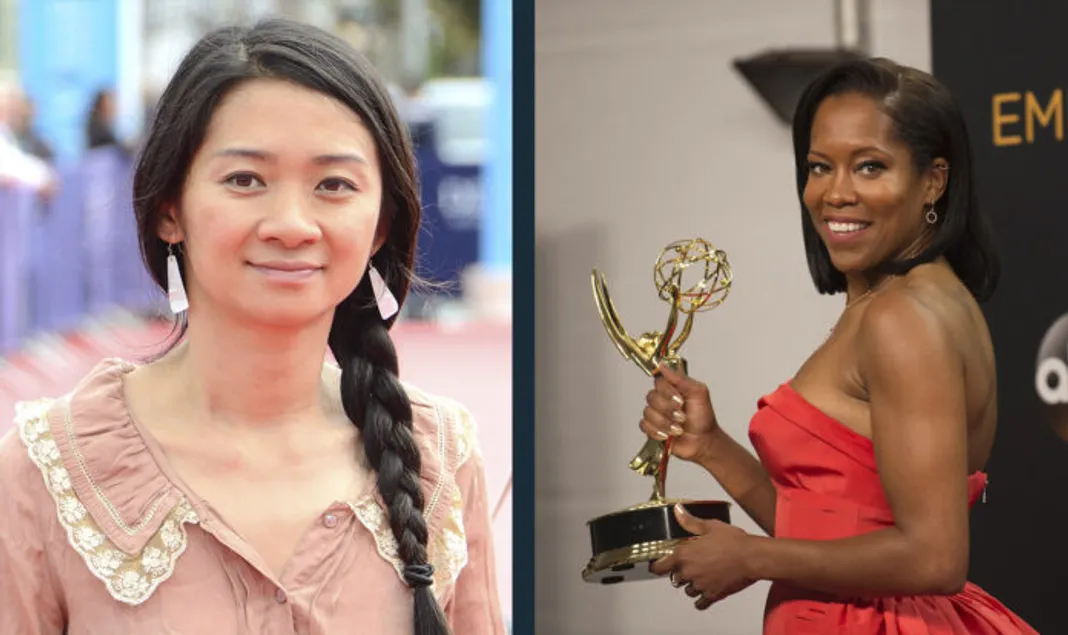March marks the beginning of the month-long celebration of Women’s History Month 2022, a time to celebrate the contributions women have made in America. This year’s theme, “Providing Healing, Providing Hope,” gives tribute to caregivers and frontline workers during the pandemic as well as honors how women have provided hope and healing.
At Hollywood.com, we commemorate the strides that have been made to achieve gender equality within the entertainment industry, but there is a lot more work to be done for women’s rights in Hollywood.
2021 saw progress for women’s rights in Hollywood
In Hollywood, women stepped up to the challenge and achieved major milestones in 2021:
Chloé Zhao became the first Asian woman and the 2nd woman in history to win the 2021 Academy Award for Best Director for her film Nomadland. The award-winning director also made history as the first woman of color to direct a Marvel movie. Eternals premiered in theaters in November 2021.
View this post on Instagram
Regina King had her film, One Night in Miami, selected for the 2020 Venice Film Festival. This made her the first Black female director to have a film selected for the festival. She also became the second Black female director nominated for Best Director at the 2021 Golden Globes. Ava DuVernay was the first Black female director to be nominated in 2015 for Selma.
The 2021 Oscars made history in the acting and directing categories. Viola Davis became the most nominated Black actress for her role in Ma Rainey’s Black Bottom. The award show also marked the first time 2 women were nominated in the Best Director category: Chloé Zhao for Nomadland and Emerald Fennell for Promising Young Woman.
Mj Rodriguez became the first transgender woman to be nominated for Best Lead Actress at the 2021 Emmy Awards for her role as Blanca Evangelista in the FX series Pose. In fact, she is the first transgender actor to be nominated for any major category at the Emmys. Additionally, Mj is the first transgender woman to win the 2022 Golden Globe for Best Performance by an Actress in a Television Series –Drama.
View this post on Instagram
Hollywood women have advocated for equal treatment and change
Many women in Hollywood have been outspoken about equal representation in Hollywood. Stars like Viola Davis and Regina King have used their acceptance speeches during award shows to highlight the lack of opportunities for women of color. Mindy Kaling developed the series Never Have I Ever to offer an authentic depiction of a young Asian woman on a teen TV show.
In 2018, Shonda Rhimes’s production company, ShondaLand, collaborated with non-profit SeriesFest to provide a mentorship program for women directors. This year, Shondaland will launch its 8th season of SeriesFest. This competition welcomes all-female directors to submit projects. According to the SeriesFest website, the winner will have the chance to shadow a director for an episode of a Shondaland original series and a $5,000 stipend to use during the duration of their mentorship. The festival is taking place from May 5-11 in Denver, CO.
Fortunately, there are more female celebrities out there, like these actresses and directors, who have used their power to promote equality.
Women in Hollywood have also fought for safer spaces. In 2017, Ashley Judd, Gwyneth Paltrow, Angelina Jolie, Rose McGowan, and other celebrities spoke out about Harvey Weinstein’s sexual abuse and predatory behavior towards women. This reignited #MeToo, which was a social movement created in 2006 by Tarana Burke that fights against sexual abuse and harassment. When the non-profit organization Time’s Up worked to raise funds for victims of sexual abuse and harassment, many actresses stood in solidarity at award shows.
GOLDEN GLOBES 2018: STARS SHOWED SOLIDARITY FOR ‘I AM WITH HER’ CAMPAIGN
The talking point for golden globe 2018 fashion was the solidarity of the celebrity at the center stage. To know more https://t.co/TFUv9980Ec#goldenglobe2018fashion#goldenglobe2018 #Fashionterest pic.twitter.com/JnGJhua90s— Fashionterest (@Fashionterest_) September 21, 2018
With progress, there’s more to be done for women’s rights in Hollywood
While there were record-breaking milestones for women in Hollywood in 2021, the industry is still lacking with female representation. In a study conducted by the Center For The Study of Women In Television & Film, the percentage of women directing the top 100 grossing films dropped from 16% in 2020 to 12% in 2021. The study also shows that out of 250 top-grossing films in 2021, “94% of films had no women cinematographers, 92% had no women composers, 82% had no women directors, 73% had no women editors, and 72% had no women writers.” In USC Annenberg’s study, “Inclusion in the Director’s Chair,” women of color only made up 2% of directors for top-grossing films from 2007-2021.
These statistics aren’t just numbers; they show a deep-rooted issue. Women are continually shut out from opportunities regarding representation behind the scenes. It’s commendable that directors like Chloé Zhao and Regina King are getting the recognition they deserve, but that does not negate the jarring numbers. With all this media coverage and ongoing public discourse about gender equality in Hollywood, why did the percentage of women directors for high-grossing films drop by 4%? And why are women of color only making up 2% of directors? Only with more female representation in front and behind the camera will we see authentic and realistic stories about women.
Hollywood.com is calling for more representation
As Hollywood.com’s Danielle Hurst writes, “At Hollywood.com, we are always trying to be the best versions of ourselves and make sure that everyone feels represented.” Change can be difficult, but it is necessary.
During Women’s History Month and always, Hollywood.com will continue to work internally to diversify our team and write stories that amplify all voices, especially women.
If you’re passionate about writing stories and have ideas on ways to continue being more inclusive with our content, apply to be a contributing writer for Hollywood.com! Send at least 3 writing samples to publisher@hollywood.com.


